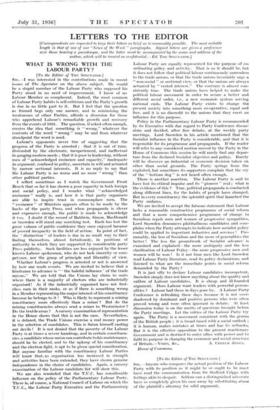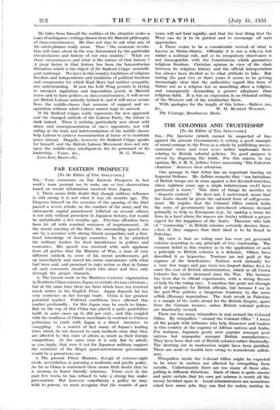[To the Editor of TUE SPECTATOR.] SIR,—Anyone who compares the
actual position of the Lebow Party with its position as it might be or ought to be must have read the communication from Sir Stafford Cripps with feelings akin to despair. Seldom can a distinguished advocate have so completely given his ease away by substituting abuse of the plaintiff's attorney for solid argument. He hides from himself the realities of the situation under a mass of ambiguous verbiage drawn from the Marxist philosophy of class-consciousness. He does not stay to ask what any of his catch-phrases really mean. Thus " the economic, revolu- tion will come about in the way determined by the particular circumstances and history of our own country." What are those circumstances and what is the nature of that history ? A great factor in that history has been the humanitarian liberalism which is the object of Sir Stafford Cripps' unintelli- gent contempt. We have in this country traditions of religious freedom and independence and traditions of political freedom 'and compromise for which Karl Marx had neither sympathy nor understanding. If now the Left Wing persists in trying to interpret capitalism and imperialism purely in Marxist terms and to base politics on class-consciousness, it will never get British Labour unitedly behind it, and it will never secure from the nliddle-classes that measure of support and co- operation without which Labour cannot hope to .succeed. If Sir Stafford Cripps really represents the new approach and the changed outlook of the Labour Party, the future is dark indeed. There is nothing particularly new about wild abuse and misrepresentation of one's opponents, nor will railing at the fears and indetermination of the middle classes help Labour to achieve reconstruction at home or to maintain peace abroad. Happily, however, Sir Stafford Cripps speaks for himself, and the British Labour Movement does not rely upon the middle-class intelligentsia for its personnel or its







































 Previous page
Previous page